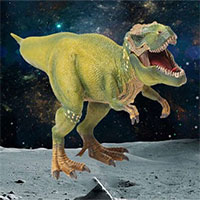Based on the results from simulation experiments, scientists have concluded that the development of the Earth so far is due to luck.
Before the arrival of intelligent humans, it took the Earth 3-4 billion years to change and create habitats. During that time, if the Earth’s climate system changes to be more extreme, humanity will disappear. So, learning about living conditions on Earth has an important influence on how humans survive.

Earth is a lucky planet when it comes to developing life. (Image: Shutterstock).
Since life first appeared, the Sun has been 30% brighter. In theory, this is warming the oceans. However, the reality shows that the sea water is still at a stable temperature. Scientists have come up with two hypotheses. First, the Earth possesses a “mechanism” of temperature regulation, preventing the climate from overheating. Second, the Earth can sustain life for billions of years purely by luck.
Studies of life on planets show that the second hypothesis is more valid.
Over the decades, scientists have found nearly 2 billion planets with ideal environments for life to thrive. However, even the closest planets to Earth are more than four light years away, or 38 trillion kilometers.
Toby Tyrrell, a professor at the University of Southampton, designed a program to simulate climate change on the planets. Specifically, he created 100,000 planets with random climate environments. The results show that the planets have severe temperature increases and decreases, making it impossible for life to develop.

Mount Pinatubo erupts in the Philippines. (Photo: Pycryl).
To investigate the habitability of planets, Toby Tyrrell continues to create life and let them grow in a stable climate. He then exposed the creatures to a series of random climate changes.
In addition, Toby also simulates natural disasters such as supervolcano eruptions, asteroid impacts, frozen water to test the adaptability of the planet.
Simulation results show that there are very few planets that sustain life for more than 3 billion years. Toby says these planets have been very lucky to have an ideal habitat.
Besides luck, a planet that wants to develop life needs “mechanisms” to adapt to climate change, Toby added.

Simulation results, the blue circle represents the planet with life lasting more than 3 billion years. (Photo: Toby Tyrrell).
Life on Earth has evolved for billions of years, largely thanks to climate stability and luck. If the Earth suddenly changes in temperature, humanity could disappear. Toby’s simulation program has helped scientists have a different perspective on the existence and development of the Earth.

